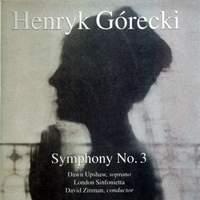Obituary,
Henryk Mikolaj Górecki
It was with much sadness that I learnt last Friday of the death of Polish composer Henryk Mikolaj Górecki, who passed away at the age of 76 in his hometown of Katowice in southern Poland after a long illness. He is a household name almost entirely through one work - his Third Symphony 'Symphony of Sorrowful Songs'. It dates from 1976 but it wasn't until the early 1990s that it achieved worldwide acclaim, following a recording featuring soprano Dawn Upshaw, the London Sinfonietta and David Zinman. For a piece of contemporary classical music it reached an audience of undreamt-of proportions, selling more than a million copies and climbing to the top of the classical music charts in both the US and the UK. It even reached number six on the mainstream UK pop charts.

Through the 1950s and 60s there was no suggestion of what was to come and Górecki was considered one of the leading composers of the Polish avant-garde. His works were typically serial and dissonant in style with frequent clashing sound masses and it was easy to cite influences such as Webern and Stockhausen. However, to the dismay of some, by the mid 1970s his style had evolved towards a simpler, more minimalist approach. His music became much more accessible to the average listener and was anchored more on tonal traditions. The relative simplicity of texture, tonality and melody of many of his works from this period onwards draws parallels with composers like Arvo Pärt and John Tavener. And with religious or mystical subject matter often at the core, their style is sometimes referred to as holy or sacred minimalism.
Henryk Górecki's Third Symphony, also known as the 'Symphony of Sorrowful Songs', is in three movements and uses three different Polish texts all with the general theme of separation through war. The first movement is the longest and uses a 15th century lament in which the Virgin Mary speaks to her son Jesus as he is dying. The second movement is based on a message written on the wall of a Gestapo cell by a teenage girl invoking the protection of the Virgin Mary, and the third is based on a folk song in which a mother grieves for the loss of her son.
I think the remarkable popularity of the Third Symphony can be attributed to two main reasons. Firstly the very approachable and very expressive musical language in which it is written, and secondly the fact that the mood which it depicts (full of anxieties and sorrow) is one which people (unfortunately) find it quite easy to associate with. The film director Tony Palmer made a film based on the work, which includes a complete performance by the same artists as the CD mentioned above, but with the music intercut with continuing interview with the composer, film of his visit to the site of the Auschwitz concentration camps (as well as documentary footage of the camp), and contemporary news footage of starving and wounded children in Africa and the Balkans. It is incredibly powerful, very moving and deeply harrowing, but probably a fairly accurate reflection of what inspired Górecki to write this work:
"I wanted to express a great sorrow… the war... the rotten times under Communism... our life today... the starving. What madness! This sorrow, it burns inside me. I cannot shake it off"
Despite the success of the Third Symphony, Górecki resisted the temptation to compose future works in exactly the same style, not interested in the commercial success or his future career, but intent on following the direction which his creative heart took him. Other significant works include three Sting Quartets (which he wrote for the Kronos Quartet) and a number of choral works. He also leaves behind an incomplete Symphony No. 4, and is survived by his wife Jadwiga; daughter Anna (a pianist); and son Mikolaj (also a composer).
You can view further details of the CD and DVD of the Third Symphony below, or click here to view a brief biography and complete discography of currently available recordings.
Górecki: Symphony No. 3, Op. 36 'Symphony of Sorrowful Songs' - CD
Dawn Upshaw (soprano), London Sinfonietta, David Zinman
The legendary 1992 recording.
Available Format: CD



